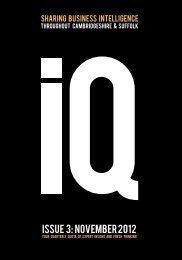IQ-Magazine-Issue-14
Create successful ePaper yourself
Turn your PDF publications into a flip-book with our unique Google optimized e-Paper software.
<strong>IQ</strong> HR<br />
Brain Wars<br />
The Trilogy<br />
We ask Sam Sales of<br />
Cambridge Interim HR how<br />
to manage conflict in the<br />
workplace<br />
Recent research shows that as an<br />
employer you devote an average of 18<br />
days in management and HR time<br />
to each disciplinary case, and <strong>14</strong>.4<br />
days to managing an employee<br />
grievance.<br />
In addition, employees in the UK<br />
spend an average of 1.8 hours per<br />
week dealing with conflict, equating to<br />
an annual ‘loss’ of 370 million working<br />
days.<br />
The requirement for us to collaborate well<br />
with others is becoming more essential to the<br />
way we work; this is a requirement against<br />
the backdrop of more conflict. It is normal<br />
for our brains to be different and to have<br />
arguments; in fact, it is healthy in a good<br />
team. It is good to be different, it just needs<br />
to be understood and managed.<br />
So how can you save money, management<br />
time and sick days?<br />
Training<br />
Train people to accept differences and to<br />
work together more effectively. Increasingly,<br />
there are some great tools based on recent<br />
brain science that can help make significant<br />
differences.<br />
Management Practices<br />
Ensure that managers look out for conflict and<br />
resolve it early. They should not be thinking<br />
it will go away. Their job title is the clue to<br />
what you should be expecting…. managing<br />
the situation, not observing. Of course,<br />
they may need some training to do this.<br />
Mediation<br />
Sometimes, if situations have<br />
been ignored or gone unnoticed<br />
and have got to the point<br />
where external impartial help<br />
is needed, the services of an<br />
external mediator may be useful.<br />
This can help employees work<br />
through the issues and recognise their<br />
feelings, and to start moving forward to<br />
resolution.<br />
In summary, disagreement and conflict can<br />
be healthy, but it needs managing and it<br />
needs to be understood. Having the skills to<br />
do this is important and sometimes external<br />
impartiality is the key.<br />
In summary, disagreement and<br />
conflict can be healthy, but it<br />
needs managing and it needs<br />
to be understood. Having the<br />
skills to do this is important and<br />
sometimes external impartiality<br />
is the key.<br />
More Information<br />
www.cambridgeinterimhr.com<br />
issue <strong>14</strong> | page 55


















